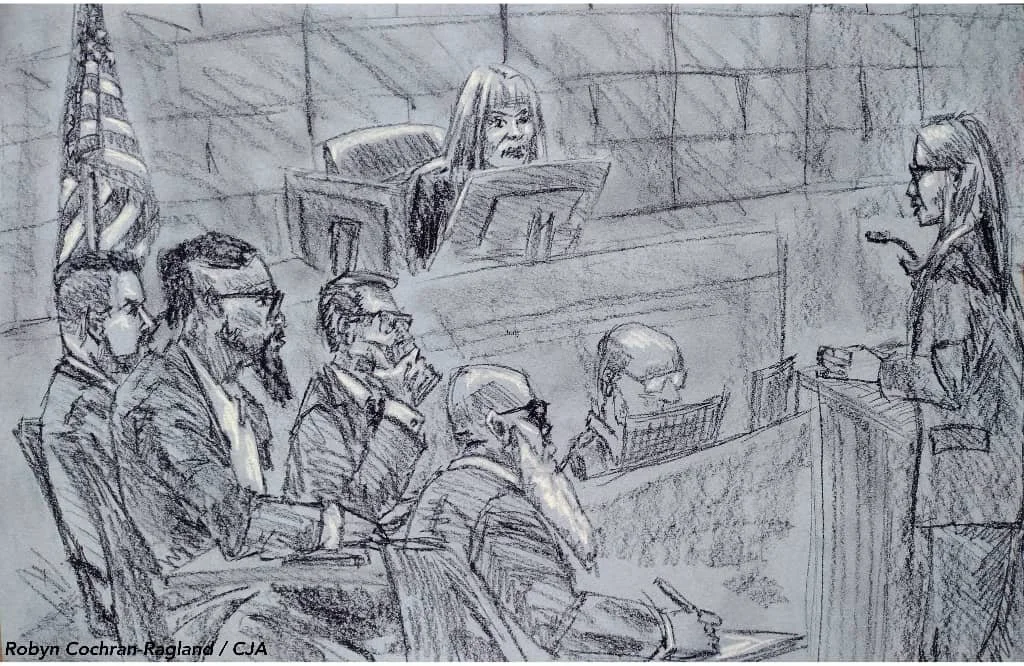Prosecutor and Defense Put Up Vivid Opening Statements on Landmark Correa Torture Trial
Michael Correa in black suit and glasses, middle left, © Robyn Cochran-Ragland/CJA
By Yusef Taylor, @FlexDan_YT
Denver, Colorado — 8th April 2025
The landmark trial of alleged former Jungler Michael Sang Correa, charged by the United States with torturing six individuals in The Gambia, continued into its second day on 8th April 2026.
Proceedings began with opening statements from the prosecution, representing the United States Government, and the defence, representing Correa, who appeared in court for a second consecutive day. The court also heard from three witnesses: an expert in West African history and security and two of Correa’s alleged victims, Alieu Jobe and Yaya Darboe.
Correa entered the courtroom in a black suit, now paired with a blue shirt and red tie, presenting a slightly altered appearance. Judge Arguello opened the session with instructions to the 12-member jury, emphasising impartiality, equal treatment of all parties, and the importance of avoiding bias by “seeing justice through their own eyes.”
Prosecution's Opening Statement - Correa Choose to Torture His Victims
Taking the floor first, the prosecution laid out a roadmap of the evidence intended to show that Correa was part of a conspiracy to torture and that he personally participated in the abuse of several victims who will testify during the trial.
Marie Zisa, legal counsel for the United States, told jurors they would hear from witnesses including Alieu Jobe, Yaya Darboe, Tamsir Jasseh, Demba Dem, Pharing Sanyang, and Sainey Bayo. Though one of the victims, Pierre Mendy, passed away of natural causes, his story would still be told through the accounts of other survivors.
Heighman’s presentation included background on The Gambia, the 2006 coup attempt, the government’s repressive response, and the roles played by then-President Yahya Jammeh and the country’s security forces—including the Gambia Armed Forces, National Intelligence Agency, and the Junglers.
She detailed how Correa allegedly participated in numerous acts of torture following the failed coup and later fled to Denver, Colorado. Pointing at Correa, Heighman narrated that Correa and his co-conspirators coerced victims into making false confessions under threat of severe punishment, telling them to “say what the panel wanted you to say or face the wrath of the Junglers.”
She also displayed photographs of several witnesses expected to testify, including Yaya Darboe, Tamsir Jasseh, Demba Dem, Pharing Sanyang, and Pierre Mendy, highlighting the brutality they allegedly endured.
Heighman concluded by stating that Correa had a choice—and he chose to torture.
Defense's Opening Statement - Correa Had No Choice But to Comply
Defence attorney Jared Westbrook opened his statement with a more analytical approach, also using a PowerPoint presentation. He argued that there was no conspiracy and that Correa, a low-ranking private, had no authority or autonomy.
Westbrook claimed that Correa was powerless to resist orders, stating that disobedience could have led to his own arrest, torture, or death. He emphasised that Correa earned just $10 a month, an amount too meagre to afford escape, and that any attempt to flee would have put his family in danger.
He urged the jury to consider the historical context and political climate under President Yahya Jammeh, who he said ruled through military dominance and crushed opposition. One slide depicted a triangle with Jammeh at the top, followed by generals and intelligence agencies, placing Correa at the very bottom of the hierarchy.
Westbrook also pointed to the complex backgrounds of some witnesses. He noted that Sainey Bayo allegedly prospered under Jammeh’s regime and that Pharing Sanyang, another alleged victim, rose to power with Jammeh and led the State House Commandos. He further mentioned that Tamsir Jasseh had worked alongside the regime and that even the Junglers lived in constant fear of retaliation.
He argued that Correa acted under duress and was subject to "unlawful and imminent danger." At that point, Judge Arguello interjected, reminding Westbrook that he was venturing into arguments rather than presenting an opening statement.
Westbrook soon concluded by asserting that Michael Correa is not guilty, claiming that under Jammeh's rule, "Jammeh was the law." He acknowledged the difficulty for jurors to fully understand the Gambian context but urged them to consider it seriously. Judge Arguello again stepped in, and Westbrook wrapped up his statement.
The next publication will feature the witness testimonies of Alieu Jobe and Yaya Darboe. Below is a link to the first publication.
U.S. Court Opens First-Ever Universal Jurisdiction Trial Against Non-Citizen for Torture

